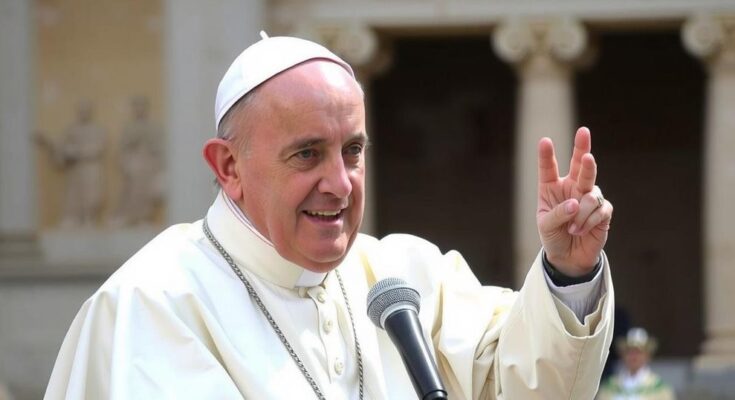The election of President Joseph Aoun marks a pivotal moment for Lebanon amidst prolonged political deadlock and economic turmoil. Ambassador Ghady El-Khoury expresses optimism about recovery, emphasizing the potential for stabilizing relations with Syria after recent regime changes. El-Khoury highlights the need for internal reforms and cooperation to address Lebanon’s socio-economic challenges following Aoun’s inaugural address, which outlines a new direction for the country.
On January 9, the newly elected President of Lebanon, Joseph Aoun, marked a significant turning point for the nation, as articulated by Ghady El-Khoury, Lebanon’s ambassador to the Holy See. His election concluded a prolonged 26-month political deadlock amid escalating economic crises. El-Khoury expressed optimism regarding Lebanon’s recovery, backed by the support of the Holy See and Pope Francis. He highlighted a potential shift in Lebanon’s political trajectory, emphasizing the need for arms consolidation under state control and reframing relationships with neighboring Syria following recent regime changes there.
General Aoun, a Christian Maronite, was appointed following intensive backing from Saudi Arabia and the United States, reflecting a newfound political opportunity arising from regional conflicts. Notably, Aoun’s inaugural address hinted at a commitment to transforming Lebanon’s approach to internal security and border control, primarily by restricting military action against Israel to the Lebanese Army. Additionally, the envoy noted the potential for improved ties with Syria considering the new regime in Damascus, as Aoun dispatched Prime Minister Najib Mikati to foster cooperation on border issues, marking a notable 15-year hiatus in official visits.
The general’s ascent instilled a sense of relief among the Lebanese populace, particularly the Christian community, with prominent leaders recognizing his address as a strategic framework for Lebanon’s redemption. El-Khoury underscored the contributions of Vatican diplomacy in resolving the stalemate, emphasizing the importance of unity among Lebanon’s diverse religious communities in fostering national stability. He posited that a democratic Syria would not only reinforce Lebanon’s recovery efforts but also redirect attention from conflict to pressing socio-economic challenges facing both countries.
Ambassador El-Khoury articulated a comprehensive vision for Lebanon’s future, advocating for urgent economic reforms, rebuilding efforts in conflict-affected regions, and bolstering national security. He acknowledged the daunting challenges that lay ahead but affirmed that pursuing these objectives concurrently is essential for achieving lasting stability and prosperity for Lebanon.
In summary, El-Khoury’s remarks reflect a cautious yet hopeful perspective towards Lebanon’s political landscape and its intricate relationship with Syria, suggesting that a cooperative and stable regional environment could facilitate necessary national reforms and recovery initiatives.
Lebanon has faced persistent political instability and economic challenges exacerbated by a prolonged presidential vacuum and regional conflicts. The recent election of Joseph Aoun as President signifies a critical juncture in Lebanese politics, marking an end to a 26-month deadlock. El-Khoury’s appointment as ambassador reflects the Lebanese government’s desire to strengthen ties with the Holy See and leverage international support for national recovery efforts. Given the interconnectedness of Lebanese and Syrian politics, recent regime changes in Syria present opportunities for diplomatic engagement aimed at fostering peace and economic stability in the region.
The election of President Joseph Aoun represents a significant advancement for Lebanon’s governance, marking an end to a lengthy stalemate and opening doors for renewed diplomatic relations with neighboring Syria. Ambassador El-Khoury’s insights underscore the intertwined destinies of Lebanon and Syria and emphasize the importance of internal reforms and collaborative stability efforts. As Lebanon navigates its complex political landscape, the ambassador’s optimistic outlook stresses the critical need for unified efforts among its religious communities and international partners to address the pressing socio-economic crises.
Original Source: www.vaticannews.va




